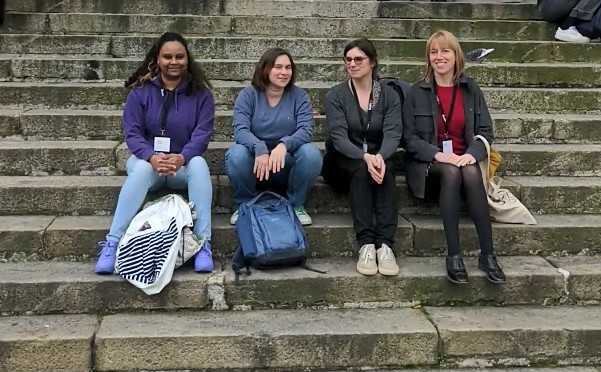Duchess at Scala.io
 |
Duchess was at Scala.io for the 2024 edition in Nantes |
A couple of months ago, a significant number of female speakers participated at the Scala.IO conference held in the city of Nantes. Thankfully, three event tickets were gifted to the Duchess France community, and we took advantage of this opportunity to write and share what we’ve learned from these speakers.
Focus on Monica’s talk
Monica shared with us valuable knowledge that she acquired while learning Scala for the first time.
Help others to help you
Junior people should focus on providing context, goal, and more generally be great communicators.
Let us fail
Let junior developers making and owning mistakes.
Senior people should let junior people (or newcomers in the teams) fail so they can take ownership of their mistakes and learn from them. If you’re a senior developer don’t solve the problem for your teammates but rather teach them the steps to tackle the problem. Enable the team to solve their own problems, even if it takes a little longer.
Find a community
Going to conferences and meetups.
Pair programming, mob programming sessions with your team.
Focus on Johanna’s and Mehdi’s talk
Starting with a few dance steps, Johanna and Mehdi presented Kapoeira.
Based on cucumber-scala, Kapoeira is an open source library which implements acceptance tests on kafka streams.
It provides a simple language based on Gherkin standards (Given - When - Then) so an automated test can be written by a QA, a PO, or a developer.
If you’re looking for high level automated test on kafka stream, you should definitely watch this video.
Plus you will love many references about La Cité de la Peur, a classic french comedy.
🎥🇬🇧🌴 Youpi dansons la Kapoeira en testant nos Kafka streams 🕺 💃

Focus on Sophie’s talk
If you’re not completely comfortable at explaining the concept of contravariance, you should checkout Sophie’s talk. She explains this concept in a very clear way with simple examples.
She gives practical use cases, using an Animal type with concrete sub-types.
As a prerequiste you should be comfortable with substitution, when you have an Animal you can pass an instance of Dog,
and with type classes, a trait that takes one or more parameters.
Invariance
trait Rescue[A]:
def adopt(name: String): A
There is no +, Rescue is invariant in A, even though Dog is a subtype of Animal there is no relation between Rescue[Dog] and Rescue[Animal]
Covariance
trait Rescue[+A]:
def adopt(name: String): A
With that little + Rescue is covariant in A so if Dog is subtype of Animal, then Rescue[Dog] is a subtype of Rescue[Animal]
Then you can write
def adopt(name:String)(using rescue: Rescue[Animal]): Animal = rescue.adpot(name)
var poppy = adopt(name = "Poppy")
Contravariance
trait Clinic[-A]:
def examine(partient: A): String
With that little - Clinic is contravariant in A so if Dog is a subtype of Animal then Clinic[Animal] is subtype of Clinic[Dog], here the relationship is inverted
Then you can write
def examine(dog:Dog)(using clinic:Clinic[Dog]): String = clinic.eximaine(dog)
val medor = Dog("Médor", bred = DogBred.Labrador)
val examintionReport = examine(medor)(using sumon[Clinic[Animal]])
🎥🇬🇧 Contravariance: intuition building from first principles

Focus on Olya’s talk
Olya shares her exploration of the Ukrainian Scala community and reflects on the lessons learned in the process of community building while setting up a book club within her company Intellias. Given the war with Russia, it is now physically unsafe for people to gather, so they have created an online community and meet each week to discuss one chapter of the book. This format allows people who were forced to leave the country, as well as guests to join the meetings. In addition, they experimented with different formats and added “Scala Breaks” - small reports with examples of interesting problems or simply a scala of related topics. Thus, they have already read 5 books and held more than 45 meetings.
🎥🇬🇧 Ukraine’s Scala community building lessons

It was nice to meet scala ladies, and there is now a new channel #functional_programming in our slack!
Let’s finish with the traditional Duchess picture.


